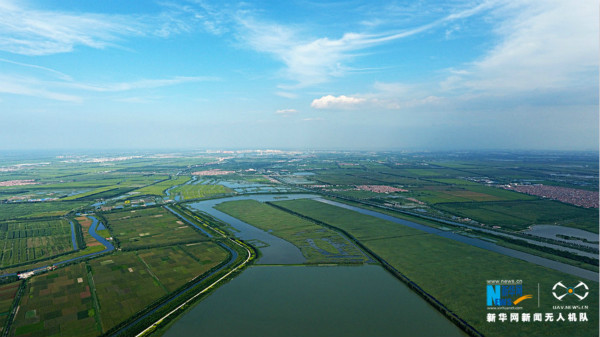Ecological restoration helps Tianjin's Qilihai Wetland regain vitality
Thanks to the painstaking efforts to restore ecology, Qilihai Wetland in Ninghe district in north China's Tianjin municipality has not only improved its environment, but also brought income growth to residents.

Qilihai Wetland [Photo/Xinhua]
The wetland, which covers 87.12 square kilometers of core areas and buffer zones, as well as 4,000 hectares of reeds and 2,333 hectares of water areas, is surrounded by 38 villages of 6 townships that are home to 120,000 people. Aquaculture was a major industry there.
Around 2012, Qilihai Wetland started developing tourism, and could receive over 10,000 visitors per day at most.
"We wanted to exploit the wetland and enrich the residents," said Chen Li, head of the management committee of the Qilihai Wetland nature reserve. However, the lack of planning, the use of fertilizers, as well as the discharge of domestic sewage and garbage had all brought severe environmental issues to the nature reserve, he introduced.
To address the problem, leaders of Tianjin municipality had visited Qilihai Wetland for multiple times to make restoration plans.
In 2015, the wetland park in the region was shut down, then demolished two years later to restore vegetation. Besides, the municipality implemented 10 major projects to restore the ecology there.
"In 2017, 4,560 hectares of land in Qilihai Wetland's core areas were transferred and cleared for closed management; last year, another 3,700 hectares were transferred," introduced Chen Yong, head of Tianjin Municipal Bureau of Planning and Natural Resources. In addition, a massive ecological relocation project is scheduled to be implemented at the end of this year, which involves 25,000 residents from 5 villages in the buffer zones, he added.
So far, 1,086 parks, plank roads, docks, hotels and restaurants in the Qilihai Wetland nature reserve have been demolished, totaling over a million square meters.
Du Naihe is a villager from Qilihai Wetland who started running crab breeding business in 1980s. Several years ago, he contracted 333 hectares of fishponds and opened an agritainment facility.
"My agritainment facility and fishponds were requested to be closed and moved out of Qilihai Wetland on Dec. 26, 2017," Du told the People's Daily.
However, the man was not discouraged and started over again. Last year, he took the lead to establish a mixed farming cooperative which plants rice and raises crabs in the rice paddies outside the "ecological red line".
"The juvenile crabs eat pests in the paddies, so there's no need for us to use pesticides or extra fodder. In addition, the excrement of the crabs also enhances the fertility of the soil," Du explained.
"I can make at least 500,000 yuan ($73,156) this year from my 13,000 kilograms of crabs," he said, adding that it's worthy to move out of Qilihai Wetland.
The mixed farming mode soon became popular in nearby villages, and a special technical service group was established to guide the villagers.
"Based on conservative estimation, the mixed farming mode can increase 500 to 1,000 yuan of income every 667 square meters," said Wang Jin, director of Ninghe district's commission for agriculture and rural affairs. According to him, the district is expected to see an income growth of nearly 100 million yuan for its over 10,000 hectares of rice-crab commensal fields.
So far, the district has finished 6 out of its 10 major projects of ecological restoration, which effectively recovered the ecological functions of the wetland, Chen said.
Over 1,400 oriental storks visited the wetland this spring, and some endangered bird species that had disappeared for over 10 years also foraged there, including reed parrotbill, Chinese penduline tit and bearded reedling, he introduced.
"Qilihai wetland is clean now, and the concentration of negative oxygen ions here is tens of times higher than that in the downtown," Du said, adding that what they gave up years ago was merely short-term interests, but what they created for future generations was infinite vitality.
























